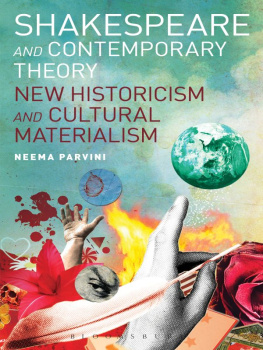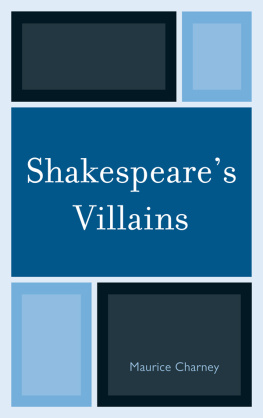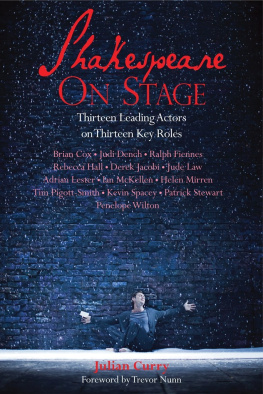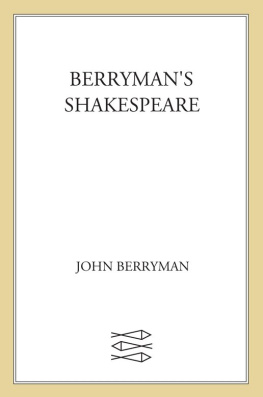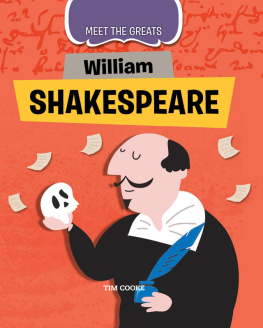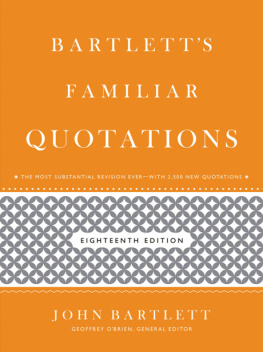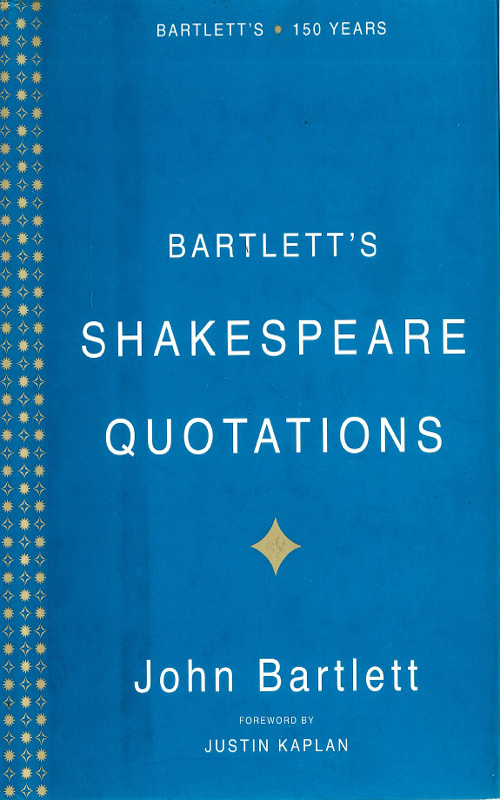Copyright 2005 by Little, Brown and Company
Foreword copyright 2005 by Justin Kaplan
All rights reserved. No part of this book may be reproduced in any form or by any electronic or mechanical means, including information storage and retrieval systems, without permission in writing from the publisher, except by a reviewer who may quote brief passages in a review.
Little, Brown and Company
Warner Books, Inc.
Hachette Book Group
237 Park Avenue
New York, NY 10017
Visit our website at www.HachetteBookGroup.com
www.twitter.com/littlebrown
First eBook Edition: October 2009
The quotations in this book are from Bartletts Familiar Quotations, Seventeenth Edition, Justin Kaplan, General Editor.
ISBN: 978-0-316-08666-0

In 1855, John Bartlett, a Cambridge, Massachusetts, bookseller and self-educated scholar, first published the volume of quotations that today, greatly expanded and brought up-to-date to reflect modern taste, needs, and usage, still bears his name. By the time of his death in 1905 at the age of eighty-five, he had made his name as generic for quotations as Noah Websters is for dictionary definitions. His declared aim was to show the obligations our language owes to various authors for numerous phrases and familiar quotations which have become household words. (Youll find the phrase household words in Shakespeares Henry V.)
The prime components of Bartletts original edition were the King James Bible and the works of Shakespeare. By a remarkable, even miraculous, confluence of cultural forces, these two wellsprings of literature and English language as we now know it came into being within a decade or so of each other. By 1604, the year King James I convened a conference of scholars and translators at Hampton Court and commissioned them to prepare an Authorized Version of the Bible, more than a dozen of Shakespeares plays, including Hamlet, were already in print. The translators finished their work in 1611, a year that also saw a performance of Shakespeares The Tempest at the royal court.
This collection of about two thousand familiar and essential passages from Shakespeare is drawn from the seventeenth edition of Bartletts Familiar Quotations (2002). Contemporary appreciation of Shakespeare differs somewhat from that of John Bartlett and his near successors, who tended to value the tragedies at the expense of the comedies and poems. Recent editors have tried to correct the balance. In any case, youll find more Shakespeare in the current edition of Bartletts than ever before: eloquent and memorable passages of a sort that Matthew Arnold called touchstones because they meet the tests and also set the standards of highest excellence. In obedience to modern taste and usage, the space Bartletts gives to some other major English writers, Alexander Pope, for example, has been abridged rather than expanded over the years. But Shakespeare, as his contemporary Ben Jonson recognized, was not of an age, but for all time! At the very least this collection can serve as an informal concordance to Shakespeare, a quiz and game book, and a memory jogger that invites you to sample and then go deeper into one of the glories of world literature. Brush up your Shakespeare, says Cole Porters lyric in Kiss Me, Kate. Start quoting him now.
Mr. William Shakespeare was born at Stratford upon Avon in the County of Warwick, the biographer and antiquarian John Aubrey wrote in 1690. His father was a butcher, and I have been told heretofore by some of the neighbors that when he was a boy he exercised his fathers trade, but when he killed a calf he would do it in a high style and make a speech. According to other accounts, in his early years he may have been a country schoolteacher, a member of a company of traveling players, and a fugitive from justice for poaching deer. Despite his shadowy and unpromising past, the work of this small-town Englishman, the beneficiary of only a provincial grammar school education, has been translated, performed, and read in virtually every human tongue.
How Shakespeare managed to know so much and understand it so incomparably no one can explain. Never doubted in his lifetime or for several centuries after, starting in the mid-nineteenth century, Shakespeares authorship of the plays and poems attributed to him began to be questioned. Among the candidates put forward to replace him as sole and true author of the tragedies, comedies, history plays, and poems have been Francis Bacon (his identity supposedly hidden in codes and ciphers), the Earl of Oxford, and others endowed with high birth and a university education. According to the anti-Stratfordian argument, someone with Shakespeares rudimentary education, obscure position in society, and apparent lack of legal and classical learning and of personal familiarity with the tangled affairs of kings and queens should not have been capable of writing what and as he did. The same narrow logic, although espoused by Sigmund Freud, among others, discounts the role of genius in the work of our myriad-minded Shakespeare, as Coleridge called him. Shakespeares authorship of the works (of Shakespeare remains secure, the controversy easily defused by the joke that if William Shakespeare did not write his works, someone else with the same name did.
Of all modern, and perhaps ancient poets, John Dryden wrote in 1666, Shakespeare had the largest and most comprehensive soul. He was not a man, he was a continent, Gustave Flaubert wrote. He contained whole crowds of great men, entire landscapes. Shakespeare is the Canon, the critic Harold Bloom writes. He sets the standards and the limits of literature. Quotable quotations about Shakespeare are a category in themselves.
Bartletts Shakespeare is also a reminder of the extent to which the work of this greatest of English-language poets and dramatists has entered and formed our daily speech without our necessarily being aware of it. We say sink or swim but probably dont realize that we may be quoting from Henry IV, Part I. Comparably, many other Shakespearean phrases, idioms, and images have worked their way into daily discourse: Forever and a day (As You Like It), for example, and So much for him (Hamlet), In my minds eye (Hamlet again), Play the villain (Othello), We have seen better days (Timon of Athens), A charmed life and Out, damned spot! (Macbeth), More sinnd against than sinning and Every inch a king (King Lear), Whats in a name? and Star-crossd lovers (Romeo and Juliet), My salad days (Antony and Cleopatra), We happy few (Henry V), and, almost inevitably, Lets kill all the lawyers (Henry VI, Part II). Such phrases are part of the language that most literate people use, a telegraphic or shorthand common tongue composed of quotations and allusions that surface from an almost pre-intellectual level of consciousness. We use these fragments to add point and luster to our own utterances.
For about five centuries the plays and poems of Shakespeare have formed the air we breathe and the blood in our veins. Its possible that even the semiliterate Mississippi Valley lunkheads Mark Twain portrayed in Huckleberry Finn enjoyed a greater intimacy with at least a few of the tragedies and history plays of Shakespeare than many educated people do today. According to a venerable anecdote, someone seeing



